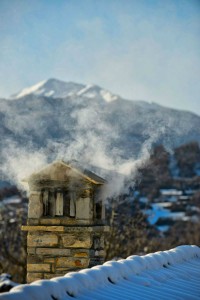 When winter strikes its ugly head, it’s easy to see what winter is doing to your car, your lawn and even your mood, but have you ever stopped to wonder what the cold is doing to your chimney? Often ignored until it is too late, your chimney endures a lot of exposure during the winter and it is important to understand the potential damage your chimney has after winter has taken its toll. Here are some ways cold affects your chimney and how you can maintain your chimney even during the coldest weather.
When winter strikes its ugly head, it’s easy to see what winter is doing to your car, your lawn and even your mood, but have you ever stopped to wonder what the cold is doing to your chimney? Often ignored until it is too late, your chimney endures a lot of exposure during the winter and it is important to understand the potential damage your chimney has after winter has taken its toll. Here are some ways cold affects your chimney and how you can maintain your chimney even during the coldest weather.
Cold Weather Can Damage Your Chimney
If the cold weather can damage other components of your home imagine what it is doing to your chimney. In the cold winter, all the masonry, bricks, and flue will contract. As the warm weather begins again, and each material will expand at slightly different rates and cause the bricks and mortar to crack, break and crumble. This is the same effect as we see increased potholes on the roads after the snow melts away. Any crack in your chimney in the inside or outside is not a good sign and can cause water leaking and water damage and continuing to use a fire in the fireplace with a cracked flue liner only causes more deterioration in the chimney mortar. If not addressed, your chimney will become unusable and can even shift or collapse and this can result in expensive repairs.
Cold Air Can Affect Your Fireplace Or Woodstove
If you heat your home with a fireplace or other wood-burning appliance then the cold air could be doing damage you don’t realize. When cold air is pushed down your chimney, it battles with the hot air attempting to go up the chimney when you light your fire. The result is often that it’s difficult for you to light fires in your home, and it may even cause your fires to not burn hot enough. This is what’s known as the stack effect, when the cold air pushing down towards your chimney, causing a backdraft [http://www.woodheat.org/all-about-chimneys.html]. This not only makes it difficult to light fires but can also result in unpleasant odors when you light your fire. You want to do everything you can to avoid drafts and prevent cold air from pushing down your chimney.
How You Can Protect Your Chimney
There are several things homeowners can do to protect their chimneys from cold air and other elements of harsh winter weather. For starters, make sure your damper is completely shut when your chimney and fireplace are not in use. This will prohibit cold air from plunging into your chimney. If you’d like to further guarantee that your chimney is protected you may want to consider investing in a top-sealing damper, which will seal the chimney from the top, instead of at the throat. Chimney caps are also available that will cover the chimney and seal it shut when it’s not in use. Additional benefits to these products include:
Moisture will not enter your chimney
Debris like leaves and sticks will not enter your chimney
Small animals and birds will not fall in your chimney
This winter, keep cold air where it belongs – outside your home. Invest in quality products and trust your chimney experts to keep your chimney clean, dry and warm. The chimney professionals at Total Chimney Care in New Haven and Fairfield [https://www.totalchimneycare.com/] are available to recommend products as well as inspect your chimney for any damage or leaks. Protect your chimney from cold air this season and don’t let winter get the best of your chimney.
